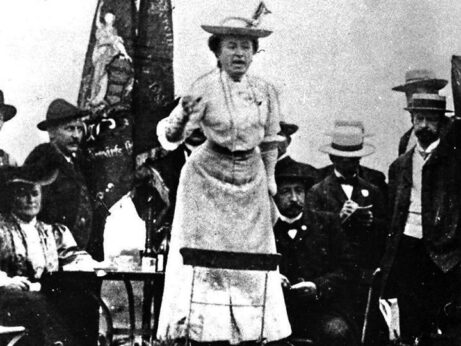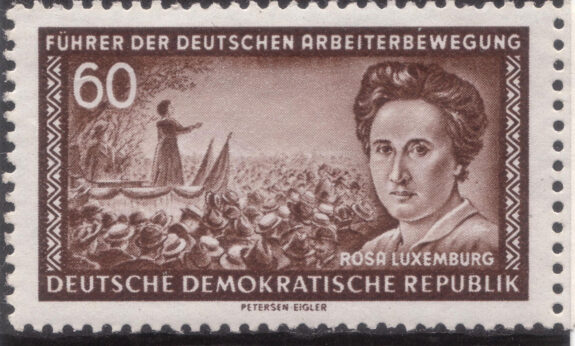
On March 5, 2021, we celebrate the 150th anniversary of Rosa Luxemburg’s birth. No one who wishes to get a sense of Rosa Luxemburg as a person, both political and private, will regret watching Margarethe von Trotta’s meticulously researched 1986 film of the same name. It is available with English subtitles.
The film begins on December 7, 1916, with Rosa Luxemburg in Vronke prison, cutting back to this location again and again. Von Trotta uses Luxemburg’s prison letters to her good friend Sonja Liebknecht like a leitmotif right through the film to paint a sensitive and personal portrait of this Polish revolutionary. From this prison, the viewer relives many episodes of Rosa’s life in flashbacks. Some of these evoke the more personal aspects of the Polish revolutionary’s life. Early childhood is touched on. Some of these sequences are in Polish, adding greatly to the authentic feel of the film. Indeed, throughout the film, Luxemburg occasionally speaks in Polish, especially to Leo Jogiches, her close comrade and lover of many years. It is also suggested she may have had polio, as Barbara Sukowa, the actress who superbly embodies her character, limps noticeably during the film.
Luxemburg’s deep love for nature is emphasized in many ways—in her letters and in her tenderness for animals, her pet cat, and her “garden” in the prison. This garden comes as a surprise but is true to history. Luxemburg enthusiastically wrote to Sonja Liebknecht on May 19, 1917, “I can hardly believe my eyes, today I planted something for the first time in my life and everything has turned out so well right away!” Luxemburg’s collection of dried plants was long considered lost and only rediscovered in 2009 in a Warsaw archive, 23 years after this film was made. Her herbarium and nature drawings are an impressive document of her resilience during imprisonment in various jails, including in Vronke, where she tended the prison garden. Rosa’s tenderness and love of nature, of animals, so manifest in her letters, finds other expressions too, toward children and her close friends, creating the sense of a profoundly humane person.
Luxemburg the private person and the political activist are presented as inseparable. Her uncompromising humanity motivates everything she does.

Von Trotta does a magnificent job in bringing together important stages in Luxemburg’s political career, going back to earlier imprisonment in Poland for her involvement with the then strongest workers party in Europe, the German Social Democratic Party (SPD). At times, it can be a little difficult to pinpoint the exact time of an event, and von Trotta does not tell the story strictly sequentially. What emerges is a consistency of Luxemburg’s views.
The main parts of the film focus on Luxemburg’s political activity in Berlin. Considerable time is devoted to Luxemburg’s growing disillusionment with the SPD. It shows her disgust of Eduard Bernstein and her early alliance with Karl Kautsky. Poignantly, the SPD leader Friedrich Ebert says to Luxemburg at a dinner party that events in Russia have ultra-radicalized her, and continues, in chilling foreshadowing, “we will hang you.”
From early on, she senses and tackles the reformism of the SPD leadership. The film shows her political break with Kautsky and other leaders of the SPD, although she remains a lifelong friend and correspondent of his wife Luise. The complete betrayal of the social democratic leadership becomes shockingly clear in the scene where Karl Liebknecht emerges from the Reichstag to tell her that all SPD parliamentarians had voted in favor of the granting of war funds. Liebknecht was the only member of parliament in 1914 to oppose these. National chauvinism as a direct result of this party’s reformism drives them into their disastrous support for World War I.
Luxemburg, keenly aware of the growing danger of war from very early on, unmasks the profoundly inhuman nature of wartime and again, as the senseless slaughter of the working people in the interests of power and profits. She steps up her activities even more as the war approaches, and increasingly, the anti-war struggle becomes a central focus of the film. All speeches quoted in the film are documented, and apply uncannily to our own times, over a hundred years and two world wars later:
“Were we suddenly to lose sight of all these happenings and maneuvers…could we say, for instance, that for forty years we have had uninterrupted peace. This idea, which considers exclusively events on the European continent, ignores the very reason why we have had no war in Europe for decades is the fact that international antagonisms have grown infinitely beyond the narrow confines of the European continent. European problems and interests are now fought out on the world seas and in the by-corners of Europe. Hence the ‘United States of Europe’ is an idea which runs directly counter both economically and politically to the path of progress.”
Following her arrest for speaking at an anti-war rally in Berlin in 1913, she defended herself in the courtroom: “When the majority of working people realize…that wars are barbaric, deeply immoral, reactionary, and anti-people, then wars will have become impossible.”
Faced with the betrayal of the SPD leadership, Liebknecht, Luxemburg, and Clara Zetkin discuss the need for a new party, the Spartacus League, which went on to become the Communist Party. Luxemburg is put in “protective custody,” imprisoned again on July 10, 1916, first in Berlin, later in Vronke Fortress, and finally in the then-German city of Breslau, now Wroclaw in Poland. She was released on November 9, 1918. During this time, she is allowed books and letters, and secretly passes visitors her contributions to the “Spartacus Letters.”

On the day of Luxemburg’s release, the Kaiser abdicates, and SPD politician Philipp Scheidemann proclaims Germany a republic, with SPD leader Friedrich Ebert taking power. He prevents the country from turning into the soviet socialist republic which Liebknecht proclaims on the same day. The Communist Party of Germany is founded on New Year’s Day 1919. Uprisings in Berlin against the Ebert government follow in the second week of January. Luxemburg and Liebknecht do not see eye to eye in the analysis of the rising. They are now on the wanted list. They are betrayed, tracked to their hiding place on January 15, 1919, and the rest is history.
The film does not make clear Ebert’s final betrayal of his erstwhile comrades: General Staff Officer Captain Waldemar Pabst informed the Reich government at an early stage about the arrest of the two. Pabst took the decision to have Liebknecht and Luxemburg murdered, considering the executions in the national interest. Pabst lived until 1970 in West Germany and in old age maintained that the SPD leadership, in the persons of Gustav Noske and in all likelihood Ebert, had agreed to the killings.
Expressing her profound belief in the eventual and unstoppable liberation of humankind, Luxemburg declares:
“In Schiller’s drama, Wallenstein says on the night that was to be his last, as he gazes with inquiring eyes at the stars to unravel in them the course of things to come: ‘The day is near, and Mars rules the hour.’ This also applies to today’s times. Mars, the bloody god of war, still rules the hour. Power is still with those who rely solely on a forest of murderous weapons to thwart the working people in their just struggle. Wars are still being prepared, parliament is still being controlled, and more and more military bills are passed, the people are still being sucked to the last drop by the gluttonous Moloch of Militarism. Mars still rules the hour. But, as Wallenstein said, ‘The day is near, the day that is ours.’ So, too, the day approaches when we who are at the bottom will rise! Not to carry out that bloody fantasy of mutiny and slaughter that hovers before the terrified eyes of the prosecutors, no, we who will rise to power will be the first to realize a social order worthy of the human race, a society that knows no exploitation of one human by another, that knows no genocide, a society that will realize the ideals of both the oldest founders of religion and the greatest philosophers of humanity. In order to bring about this new day as quickly as possible we must use our utmost powers, without looking to any success, in defiance of all public prosecutors, in defiance of all military power. Our slogan will become reality: The people are with us, victory is with us!”










